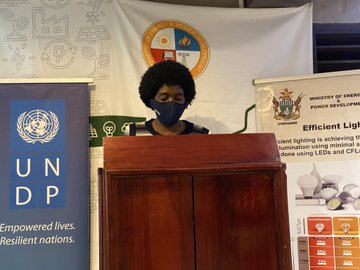By Anyway Yotamu
The government said the implementation of the National Renewable Energy and the Biofuels Policy which was launched early this year by President Emmerson Mnangagwa is well on course, a move that will create a conducive environment for the development of renewable energy.
The policy seeks to promote optimal supply and utilisation of energy for socio-economic development in a safe, sustainable manner.
The government is seeking to prioritise the exploitation of renewable energy and a guideline on its structure.
The remarks were made at the Energy Stakeholders Workshop in Harare on Wednesday by Energy and Power Development Minister Soda Zhemu in a speech read on his behalf by his Deputy Magna Mudyiwa.
“Government is working tirelessly on the implementation of the Sustainable Development Goal Number 7 (SDG7) which requires that we increase the use of renewable energy and double the improvement in energy efficiency by 2030. In line with our long-term vision of achieving universal energy access for all by 2030, we have started a process of developing a National Energy Efficiency Policy,” he said.
“These strategic documents are meant to provide a clear roadmap for attracting investment, regulation of local energy operations, and creation of an enabling environment for players in the energy sector, particularly the private sector among others, “the Minister said.
He added that “Our markets are flooded with inefficient products. As I speak, some industries are still using inefficient mercury vapour lighting units among others instead of LED lights. Our electric motors, pumps, and steam heating systems in the industry, mining, and agriculture are also inefficient. In addition, some of the pumps in agriculture need to be properly sized,” he said.
The current situation calls upon nations to focus on low carbon climate-resilient development pathways which can bring multiple wins for society, the economy, and the environment.
Addressing delegates at the same occasion United Nations Development Program (UNDP) Resident Representative to Zimbabwe Mr. Georges van Montfort said, “We are excited that we are partnering with the Government of Zimbabwe to kick start this very important intervention. This inception workshop comes at a critical juncture for Zimbabwe as the country is in the process of developing a 5 year National Development Strategy”, he said.
“We are also delighted as UNDP that we have supported the country to develop the Low Emissions Development Strategy (LEDS), the first Nationally Determined Contribution for the Paris Climate Agreement, and we are currently supporting the revision of the NDCs”.
“The LEDS unearthed some of the gaps and opportunities that we can undertake to address, including the adoption of energy efficiency measures to reduce electricity demand and technical losses in the power system. Just to give an idea of the potential, the National Energy Efficiency Audit of 2015 identified that 377. 67MW savings amounting to 27% of average national demand could be attained if Energy Efficiency measures were to be adopted”, said Mr. Montfort.
“On the other hand, we have seen the entrepreneurial spirit of the Zimbabweans in overcoming the energy challenges and while I do not have the scientific evidence the growth of the solar industry in Zimbabwe has been unprecedented. As UNDP, I would like to pledge our continued support to the development and implementation of this important policy, ” he added.
Under the Nationally Determined Contributions, Zimbabwe is expected to reduce its emissions by 33% per capita by the year 2030 in the energy sector which contributes to more than 50% of the emissions.
